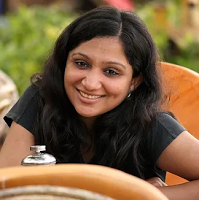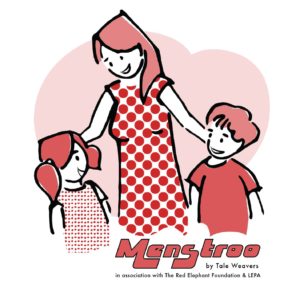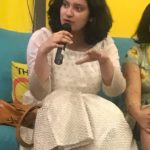Tales of Change: Interview with Sharda Vishwanathan, Founder Tale Weavers
Stories play a powerful role in shaping children’s perspectives about themselves, others or the world we live in. Tale Weavers is an organization which creates parallel narratives that not only challenge stereotypes but also help empower children with different life skills.

Sourya (S): What kind of a student were you when you were younger? Reserved or mischievous?
Sharda (SH): I was very shy and timid. Not very outgoing, I was always crowd-phobic, conscious about sharing my thoughts.
(S): Were you always entrepreneurial from your childhood days?
Sharda (SH): I wouldn’t say I was entrepreneurial but for sure was curious. I always was buzzing with questions but was most of the times was afraid to ask them.
(S): What lead you to study Gender, Media, and Culture at London School of Economics? How would you say that course has shaped/impacted you as a person?
Sharda (SH): Growing up, it was not uncommon to get exposed to stereotypes of every kind. I was no exception to this. “Oh, you are a girl and you shouldn’t be out playing until late!” or “Be strong like a boy. Don’t cry like girls!” were some of the common statements one would hear often and there was always the pressure to fit into society’s preconceived notion of what is expected of a girl or a boy. And I would often question such statements only to find no answers. I remember when I was in college, television was swamped with what we used to call the ‘K’ serials- Kyunki Saas Bhi Kabhi Bahu Thi, Kahaani Ghar Ghar Ki, and many more soaps, where one finds the representation of women in an archaic set up, upholding traditional patriarchal values. These values often restrict and relegate her to the domestic sphere while men are represented as the decision-makers. What was really intriguing was the fact that the society also clung to these stereotypical characterizations without dismissing the image of women as a mere appendage of the larger extended patriarchal society. This somewhere was instrumental in furthering my interest in analysing media and culture from a gendered perspective and I pursued my Masters in Gender, Media and Culture at London School of Economics and Political Science. The Master’s programme equipped me with a wide range of theoretical understanding of gender while facilitating the understanding of intersectionality across the various socio-economic and cultural spheres.
(S): Did you spend a lot of your college time volunteering? What did it teach you? (Your article on Off-Campus Class will be linked here after your answer.)
Sharda (SH): To be very honest, I did not take up volunteering during college. But as soon as I finished college, I realized that volunteering is a great opportunity to build new skills and can act as a great catalyst in shaping one’s career trajectory. It was only during my Master’s and when started working that I started volunteering with organizations in the development sector. For me personally, it was a great learning experience and helped me make an informed decision before I decided to work in the development sector.
(S): What exactly is Tale Weavers? How did the idea of Tale Weavers come about?
 Sharda (SH): Tale Weavers is an initiative that aims to engage with children and the youth through stories that challenge stereotypes and break the barriers to creating a just society. Stories play a powerful role in shaping children’s perspectives about themselves, others, or the world we live in. Be it reinforcing the ideals of femininity or masculinity that princesses and princes possess, or creating a situation where every damsel in distress needs a man to save her, stories for centuries have continued to influence the young minds. And it is no surprise when we hear our girls expressing their love for pink or our boys expressing their desire to be strong, as they internalize these traits through these powerful narratives. I was at a park and saw this group of little girls place their hands on each other and compare which one of them had a lighter skin. The one with the darkest tone was immediately called “Kaali” (the word for ‘Black’ in Hindi) much to her disappointment. And this was not all. The fairest amongst them shared her excitement of how she was the “Snow White” of the group. Completely aghast, I could not stop but question the extent to which the media – be it literature, cinema or advertisements, continue to influence the society and reinforce the social and cultural norms that seek to normalize the ideal beauty. How can we change such narratives? Can we have stories that do not show women as damsels in distress while waiting for their knights in shining armor to come to their rescue? Plagued with these questions and reflecting on how stories continue to influence our everyday lives, I shared with Raghu Ramachandran, the Co-Founder of Tale Weavers, the need to have stories that break stereotypes and empower children with different life skills. And Raghu could not agree more and being a designer himself, he also saw the need to have visually engaging stories with colorful illustrations representing diversity to engage with children on issues around gender, race, ethnicity and so on. Thus, we embarked on this journey and decided to call the initiative Tale Weavers- Weaving Tales, Breaking Stereotypes. Tale Weavers was officially launched in March 2017. Through Tale Weavers, we wish to create an inclusive learning space, where every child has the opportunity to unleash his/ her full potential. The team at Tale Weavers strongly believes in an approach that uses alternate education and innovative methods of learning that helps self-development while facilitating the growth of a vibrant community of leaders, empathetic and sensitive to the various unmet social needs.
Sharda (SH): Tale Weavers is an initiative that aims to engage with children and the youth through stories that challenge stereotypes and break the barriers to creating a just society. Stories play a powerful role in shaping children’s perspectives about themselves, others, or the world we live in. Be it reinforcing the ideals of femininity or masculinity that princesses and princes possess, or creating a situation where every damsel in distress needs a man to save her, stories for centuries have continued to influence the young minds. And it is no surprise when we hear our girls expressing their love for pink or our boys expressing their desire to be strong, as they internalize these traits through these powerful narratives. I was at a park and saw this group of little girls place their hands on each other and compare which one of them had a lighter skin. The one with the darkest tone was immediately called “Kaali” (the word for ‘Black’ in Hindi) much to her disappointment. And this was not all. The fairest amongst them shared her excitement of how she was the “Snow White” of the group. Completely aghast, I could not stop but question the extent to which the media – be it literature, cinema or advertisements, continue to influence the society and reinforce the social and cultural norms that seek to normalize the ideal beauty. How can we change such narratives? Can we have stories that do not show women as damsels in distress while waiting for their knights in shining armor to come to their rescue? Plagued with these questions and reflecting on how stories continue to influence our everyday lives, I shared with Raghu Ramachandran, the Co-Founder of Tale Weavers, the need to have stories that break stereotypes and empower children with different life skills. And Raghu could not agree more and being a designer himself, he also saw the need to have visually engaging stories with colorful illustrations representing diversity to engage with children on issues around gender, race, ethnicity and so on. Thus, we embarked on this journey and decided to call the initiative Tale Weavers- Weaving Tales, Breaking Stereotypes. Tale Weavers was officially launched in March 2017. Through Tale Weavers, we wish to create an inclusive learning space, where every child has the opportunity to unleash his/ her full potential. The team at Tale Weavers strongly believes in an approach that uses alternate education and innovative methods of learning that helps self-development while facilitating the growth of a vibrant community of leaders, empathetic and sensitive to the various unmet social needs.
(S): What changes would you suggest in the basic education system, which could create a safer and healthier generation of adults in future?
Sharda (SH): I think in our current education system, the overemphasis on marks and grades often kills motivation and puts undue pressure on students. While grades are important, we need an approach that focuses on what a child learns and not just what a child scores. We need to create an environment that supplements theoretical knowledge with practical skills and more analytical thinking while also encouraging students to pursue their interests and not choose subjects or careers path that are considered mainstream and more success-oriented by the society. Secondly, we need to have curriculums that are gender sensitive and inclusive in nature. In the recent past, we have seen examples of textbooks that propagate gender stereotypes and also reinforce physical attributes such as fair skin as prerequisites for being successful.
(S): What are currently some of the campaigns Tale Weavers is involved with?
Sharda (SH): Tale Weavers will soon complete a year in March 2017. With the help of our diverse pool of volunteers, we have created a good resource of stories and are now prepared to host more on ground sessions and storytelling workshops for children. At the moment,  we are reaching out to schools, parents, and community centers to explore the possibility of conducting workshops. Here, I would like to make a special mention of The Red Elephant Foundation, our training partner. Tale Weavers brings in refreshing stories of change and uses interactive storytelling, while the Red Elephant Foundation plugs in the training component. Through our collaborative work, we address themes of gender equality, peace education, (equality and diversity, tolerance and inclusiveness across identities such as race, religion, nationality, colour, ethnicity, caste etc.) and also literacy on various aspects of life skills such as financial literacy, safety, menstrual hygiene, etc.
we are reaching out to schools, parents, and community centers to explore the possibility of conducting workshops. Here, I would like to make a special mention of The Red Elephant Foundation, our training partner. Tale Weavers brings in refreshing stories of change and uses interactive storytelling, while the Red Elephant Foundation plugs in the training component. Through our collaborative work, we address themes of gender equality, peace education, (equality and diversity, tolerance and inclusiveness across identities such as race, religion, nationality, colour, ethnicity, caste etc.) and also literacy on various aspects of life skills such as financial literacy, safety, menstrual hygiene, etc.
(S): You are also involved with numerous other organizations. How do you balance your time between so many initiatives?
Sharda (SH): It’s a learning process and I am trying to get that balance right 🙂 I think it’s important to prioritize and define your commitments well before you take on multiple initiatives.
(S): What next for Tale Weavers? What are your individual future plans?
Sharda (SH): We really hope to work with more schools and community centers and engage with children across the country. And we also hope to run our own community center for children and the youth where we will use alternative education as an approach to empower them and create a community of change makers.




Leave a Reply